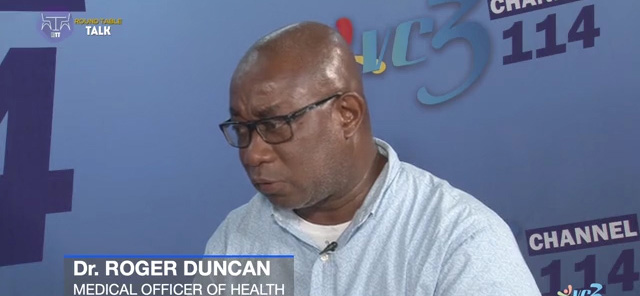The detection of 16 local cases of COVID-19 since Dec. 28, 2020 has transitioned St. Vincent and the Grenadines’ response to a different phase, a senior health official said on Tuesday.
Dr. Roger Duncan, medical officer of health, made the point at a virtual press conference at which he noted the importance of contact tracing and for persons to be honest with health officials.
However, by Wednesday, that number had risen to 28 local cases, by which time, Minister of Health, Jimmy Prince, Permanent Secretary, Cuthbert Knights, Chief Medical Officer Dr. Simone Keizer-Beache as well as two members of the administrative staff of the Ministry of Health had been advised, out of an abundance of caution, to quarantine for a period of five days, ending Saturday, Jan. 9.
Duncan told Tuesday’s press conference that persons may have to disclose sensitive personal information to health authorities.
Duncan promised that any such information would be treated with the strictest of confidence.
“If we are going to be able to stamp and reduce the number of cases, we have to know where positive cases have been, with whom they have been, when they went there, how long they stayed there, and what sort of interaction there were while they were at any given place with any given person,” Duncan said.
He said that based on the 16 local cases, health workers have traced in excess of 200 persons and have done more than 200 tests, some of which have been repeat tests.
“So if you get a call from the Ministry Health and it says that you might have been exposed to someone who has tested positive for COVID-19, first thing you do is you take this very seriously,” Duncan said.
“Second thing you do is to listen to the advice that’s coming from the health worker who is going to be in touch with you.
“And the advice basically says this: you’ve been in touch with someone who has tested positive for COVID-19; we need you to quarantine or isolate yourself until we get to you. Please do not go to your doctor; please don’t join in any neighbourhood social activities. Please, please, stay where you are, follow the instructions. We will come to you. “
Duncan said it might take some time for health workers to get to a person they contact because of the amount of contact tracing being done.
“… I know we are all anxious about knowing that I have been exposed to someone; you want to know what your status is. We know that a certain level of anxiety comes with this, but we need you to be patient, for us. It might take some time for us to get to you – a couple of hours; it might be overnight, depending on where you are and when we were informed.
“So please be patient, but please stay where you are. If in the event that you are not feeling well, then you need to let us know so that other arrangements could be made to have you either moved to one of the facilities that the CMO (Chief Medical Officer) pointed out earlier on or to give you other advice,” Duncan said.
“We know sometimes people’s social life, there are significant issues or things that you will consider private or personal. We want to assure the public that will treat any information you give us with the strictest of confidence.
“Our sole intention of getting that information is not to know about you but to be able to stop and reduce the spread of COVID-19. And if we don’t have the information, then clearly we are not going to be able to make the right decisions.
“So if what goes in is wrong, then what comes out is going to be wrong. So the action we take, based on erroneous information, is not only going to not solve the problem but it is also going to further endanger public health.”
He said there have been some issues with the COVID hotline.
“I ask you to bear with us. I think people have been in contact with several members of the task force who are known, so I think everybody’s cell number is now, you know, known to everyone. We’ve been taking calls and we’ve been asking these.”
Duncan reiterated the oft-repeated advice on avoiding exposure to COVID-19.
“Distance yourself as much as possible. If you don’t need to leave the house, please don’t leave. If you are going to leave, please wear a mask or some facial covering. Sanitise your hands regularly and keep your distance. And these are the things that are going to keep you safe, you’re reducing your risk of being exposed to someone with COVID-19 and it is going to help us immensely.
“The next couple of weeks are going to be very important for our contact tracing in terms of where we go and how many people we are in contact with. Our goal here is to identify as quickly as possible, in the shortest possible time, people who are ill with COVID-19, isolate them, find their contact, isolate and test their contact also and thus reduce the spread of COVID-19,” Duncan said.







Bull shit based on the manner in which patient no one was treated I personally do not have confidence in the system with respect to confidentiality.